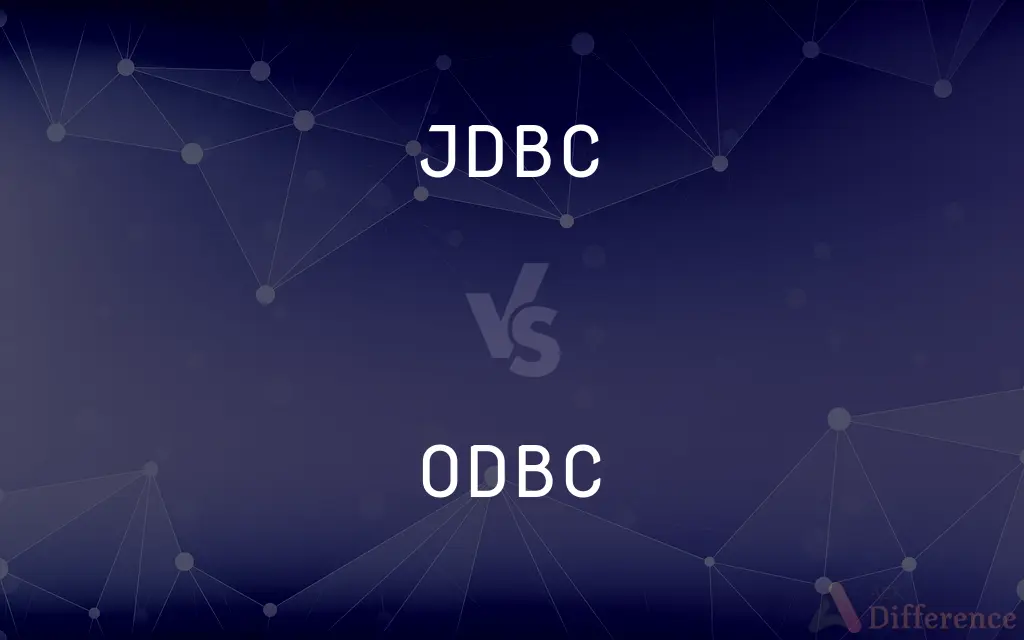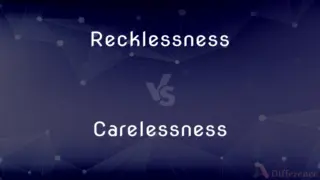JDBC vs. ODBC — What's the Difference?
By Tayyaba Rehman — Published on January 17, 2024
JDBC (Java Database Connectivity) is a Java-based data access technology, while ODBC (Open Database Connectivity) is a language-agnostic standard for database connectivity.

Difference Between JDBC and ODBC
Table of Contents
ADVERTISEMENT
Key Differences
JDBC, standing for Java Database Connectivity, is a Java API that enables Java applications to interact with databases. ODBC, or Open Database Connectivity, is a standard API used for accessing database management systems, designed to be independent of programming languages.
JDBC is specifically designed for Java environments, providing a Java interface to SQL-based relational databases. ODBC, on the other hand, is a more generic interface that can be used with various programming languages, not limited to Java.
JDBC allows developers to write Java applications that can connect to and interact with a wide range of databases. ODBC, as a language-independent interface, allows applications written in any language to access databases through ODBC drivers.
One of the key differences lies in the programming language support. JDBC is exclusively for Java applications, whereas ODBC supports multiple languages, including C, C++, and more, making it a versatile choice for various development environments.
JDBC uses Java-based data types and conventions, aligning with Java's architecture. In contrast, ODBC is designed to be universally applicable, adhering to a language-agnostic approach for database connectivity.
ADVERTISEMENT
Comparison Chart
Language Support
Exclusive to Java.
Language-agnostic, supports multiple languages.
Primary Use
Java applications accessing databases.
Universal database connectivity for various applications.
Design Focus
Java-centric, aligns with Java architecture.
Generic interface adaptable to many languages.
Data Types and Conventions
Utilizes Java data types and conventions.
Adheres to a universal standard for diverse environments.
Community and Ecosystem
Strong in Java community.
Broadly used across different programming environments.
Compare with Definitions
JDBC
It enables Java applications to interact with various databases via SQL.
JDBC allows our Java program to run SQL commands on the database.
ODBC
ODBC supports a wide range of programming languages for database connectivity.
Our C++ and Python applications both use ODBC for database interactions.
JDBC
JDBC is tailored to integrate seamlessly with Java environments.
JDBC offers a convenient way for Java developers to handle database interactions.
ODBC
ODBC is a standard API for accessing database management systems.
Our application uses ODBC drivers to access the MySQL database.
JDBC
JDBC is a Java API for connecting and executing queries in databases.
We used JDBC to connect our Java application to the SQL database.
ODBC
ODBC is designed to be independent of database systems and operating systems.
With ODBC, we can connect to various databases regardless of the OS.
JDBC
It provides a method for Java applications to establish a connection to databases.
Using JDBC, we established a secure connection to the Oracle database.
ODBC
It facilitates the connection of applications to databases through ODBC drivers.
We configured an ODBC driver for our software to interact with the database.
JDBC
JDBC supports database operations like query execution and transaction management.
We handle database transactions in our Java app through JDBC.
ODBC
It allows applications to use SQL queries with databases, regardless of the programming language.
ODBC provides a universal solution for SQL queries across different platforms.
Common Curiosities
Can ODBC be used with Java?
Yes, ODBC can be used with Java, but JDBC is typically preferred due to its integration with Java.
What is ODBC used for?
ODBC (Open Database Connectivity) is used for connecting applications to various database systems, regardless of the programming language.
Is JDBC specific to any programming language?
Yes, JDBC is specifically designed for use with the Java programming language.
How does ODBC achieve language independence?
ODBC uses a standard API that is independent of any particular programming language, allowing it to interface with various languages.
What does JDBC stand for?
JDBC stands for Java Database Connectivity.
Is JDBC suitable for enterprise-level applications?
Yes, JDBC is suitable and widely used in enterprise-level Java applications for database connectivity.
Can JDBC be used for both SQL and NoSQL databases?
Primarily, JDBC is used for SQL databases, but some NoSQL databases may offer JDBC drivers for connectivity.
Does ODBC support transactions?
Yes, ODBC supports transactions, allowing for operations like commit and rollback.
Are JDBC connections secure?
JDBC connections can be secure, especially when configured with appropriate security measures like SSL/TLS.
Is ODBC still relevant today?
Yes, ODBC remains relevant for applications that need to connect to databases across various programming environments.
How does JDBC handle SQL queries?
JDBC allows Java applications to execute SQL queries through its API, facilitating data manipulation and retrieval.
What types of databases can JDBC connect to?
JDBC can connect to any database that has a JDBC driver available, such as MySQL, Oracle, SQL Server, and more.
What are ODBC drivers?
ODBC drivers are specific implementations that enable ODBC to interact with different database systems.
What is the main advantage of using JDBC in Java?
The main advantage is its seamless integration with Java, allowing for a more natural and efficient database interaction in Java applications.
Can both JDBC and ODBC be used in the same application?
Technically yes, but it's uncommon as they serve similar purposes. Usually, one is chosen based on the application's language and requirements.
Share Your Discovery

Previous Comparison
Recklessness vs. Carelessness
Next Comparison
Syngas vs. Water GasAuthor Spotlight
Written by
Tayyaba RehmanTayyaba Rehman is a distinguished writer, currently serving as a primary contributor to askdifference.com. As a researcher in semantics and etymology, Tayyaba's passion for the complexity of languages and their distinctions has found a perfect home on the platform. Tayyaba delves into the intricacies of language, distinguishing between commonly confused words and phrases, thereby providing clarity for readers worldwide.












































